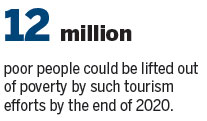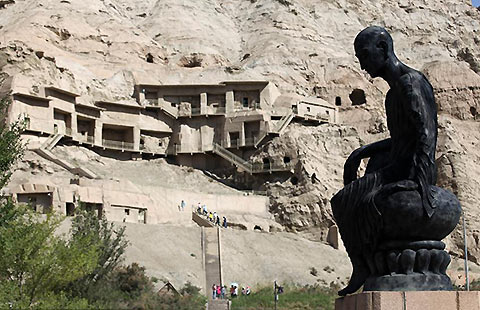Village-themed tourism to improve rural livelihoods
Updated: 2015-07-15 07:59
By Su Zhou(China Daily)
|
||||||||
More than 12 million rural people are expected to shake off poverty through village-themed tourism in the next five years, according to senior tourism officials.
Village-themed tourism has great growth potential and will continue to help improve farmers' livelihoods while integrating agriculture with industrial production and the service sector in rural areas, said Wu Wenxue, deputy director of the China National Tourism Administration.
"More than 70 percent of tourism resources are in villages, but only 30 percent of tourists visit villages. There is still space for further growth," Wu said. "In recent years, the average annual growth rate of tourist numbers and tourism income of village-themed tourism has surpassed 20 percent."
According to the tourism administration, more than 2 million rural families ran village-themed tourism services last year, and more than 100,000 villages saw 1.2 billion tourist visits, accounting for nearly one-third of the total tourist visits. More than 33 million farmers benefited from this boom.
The administration estimated that by the end of 2020, about 17 percent of poor people, or 12 million, could be lifted out of poverty by the efforts.
China has 14 poverty-stricken regions, including the mountainous Liupanshan region in the Ningxia Hui autonomous region. Highlights of these areas are the ethnic groups living there in compact communities with unpolluted environments and abundant cultural heritage.

Zhang Guangrui, honorary director of the Tourism Research Center at the Chinese Academy of Social Sciences, said village-themed tourism should develop its "unique cultural and traditional treasures".
"Tourism is all about experiencing differences. China is still undergoing urbanization. Many tourists still have a fresh memory of rural areas. Simply giving tourists an experience of living in rural areas is not enough," Zhang said.
Peng Decheng, director of the administration's Department of Planning and Finance, said a key next step is improving the infrastructure in those areas through special tourism funds involving both the government and the private sector.
"Funds would be invested to build more roads, parking lots, toilets for tourists and other infrastructure," he said. "Professionals from the culture, art and technology fields are also encouraged to use their expertise to transform rural areas into tourism villages with cultural features."
By 2020, the tourism administration expects to offer annual training courses to more than 1,000 officials from poor villages.
suzhou@chinadaily.com.cn
(China Daily 07/15/2015 page3)

 22 World Heritage Sites in China along the Silk Road
22 World Heritage Sites in China along the Silk Road
 A day of masks
A day of masks
 France celebrates Bastille Day
France celebrates Bastille Day
 China's northernmost high-speed railway enters trial operation
China's northernmost high-speed railway enters trial operation
 Eight industries the shared economy will transform
Eight industries the shared economy will transform
 Photographer in search of his 'homeland' in post-Three Gorges landscape
Photographer in search of his 'homeland' in post-Three Gorges landscape
 Japanese war orphans visit graves of adoptive Chinese parents
Japanese war orphans visit graves of adoptive Chinese parents
 Top 10 Chinese provinces with most stock market investors
Top 10 Chinese provinces with most stock market investors
Most Viewed
Editor's Picks

|

|

|

|

|

|
Today's Top News
China posts 7% GDP growth rate in Q2
Little Pluto bigger than scientists thought as flyby looms
China 'constructive' on Iran nuclear deal: foreign minister
35 million Chinese died during 14-year Japanese invasion
Pentagon tones down on China threat
Hillary Clinton calls for higher wages for everyday Americans
Stock bargains seen in market by some
IQiyi buys 800 Paramount films
US Weekly

|

|






